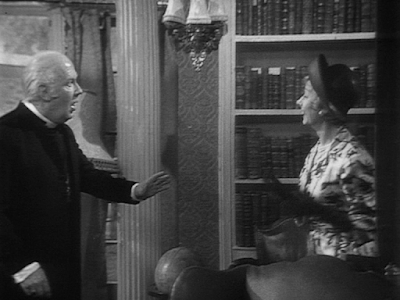This week's story operates on two different
levels. The first is familiar jolly comedy in a sitcom reality, much as you
would expect to see. It’s the annual fete at the Bishop's Palace, and the
Dean's wife is put out (as only Joan Sanderson could be put out) to discover
that the Bishop has invited another woman to open the fete. The Archdeacon is
going to tell fortunes in costume. The Dean and his wife - who must be
partially sighted for this one week - fail to recognise the Archdeacon in drag
swigging the Bishop's sherry from the decanter and assume that he is the Guest
of Honour.
This is pleasant enough, but the second level is a lot more interesting. We learn that the Bishop has invited this unseen woman to open the fete because she is an old flame/ unrequited love from his 1930s youth who has crossed his path again, and that he intends to make up for decades of lost time and propose to her today. William Mervyn is given quite a lot of time and space to reminisce to (the rather uncomprehending) Noote and Blunt about this lost love, telling a sad tale of attacks of shyness, lost opportunities, flares of jealousy at perceived rivals for her hand, and a chance reunion years later in a theatre crowd during the war when he discovered that she has married.
The Bishop comes across as bit deluded and not especially sympathetic during this reminiscence, but the writers' pleasure in telling a convincing tale of lost opportunities - and the performer's skill in rendering it - still gives him an unexpected vulnerability. So the more familiar comic mechanisms that follow eventually become frustrating in a way that they normally wouldn't. Having shown us this vulnerability, and set up a situation of very high emotional stakes - planning to propose to the great unrequited love of his life - the ball is then dropped. As you might expect the Bishop's plans are thwarted, but the reactions granted to him are only the usual familiar blunder and bluster. Tantalisingly, a little depth is momentarily introduced, but isn't then followed through.
This is pleasant enough, but the second level is a lot more interesting. We learn that the Bishop has invited this unseen woman to open the fete because she is an old flame/ unrequited love from his 1930s youth who has crossed his path again, and that he intends to make up for decades of lost time and propose to her today. William Mervyn is given quite a lot of time and space to reminisce to (the rather uncomprehending) Noote and Blunt about this lost love, telling a sad tale of attacks of shyness, lost opportunities, flares of jealousy at perceived rivals for her hand, and a chance reunion years later in a theatre crowd during the war when he discovered that she has married.
The Bishop comes across as bit deluded and not especially sympathetic during this reminiscence, but the writers' pleasure in telling a convincing tale of lost opportunities - and the performer's skill in rendering it - still gives him an unexpected vulnerability. So the more familiar comic mechanisms that follow eventually become frustrating in a way that they normally wouldn't. Having shown us this vulnerability, and set up a situation of very high emotional stakes - planning to propose to the great unrequited love of his life - the ball is then dropped. As you might expect the Bishop's plans are thwarted, but the reactions granted to him are only the usual familiar blunder and bluster. Tantalisingly, a little depth is momentarily introduced, but isn't then followed through.

No comments:
Post a Comment